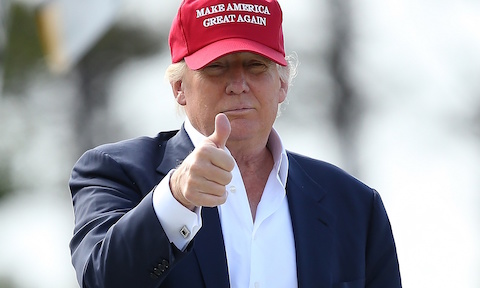How Donald Trump has changed political branding and marketing

While I don’t believe Donald Trump will win the upcoming election, he has changed American political marketing forever.
Successful politicians like Ronald Reagan, Bill Clinton, and Barack Obama all changed the rules of the game. Trump’s innovative political brand will change how politicians market themselves. Put aside your perspective on the morality of his positions and analyze the trend. How will his actions transform the practice of politics?
- Politicians will speak simply and directly. Trump, with his short, unequivocal, specific sentences, speaks unlike any other political orator. I’ve called this “batshit candor.” I think we’re going to see more candor from our candidates (but hopefully less batshit).
- They’ll master social media. Donald Trump is a whiz at Twitter, not just posting but retweeting and reacting. This puts him directly and immediately in touch with his audience as he, for example, live tweets the president’s speech or the Democratic debate. The next great candidate may stand out for skills with Facebook, Periscope, or Snapchat instead, but they will be adept with social tools.
- They’ll act in real time. Trump pivots his candidacy on the fly. He reacted far more quickly to the San Bernardino shootings than the other candidates did. This enables him to make news and manipulate the media, an agility that’s rare among other public figures. (While the others are newsjacking, Trump takes the news hostage and extracts a ransom.)
- The left-right spectrum won’t fit them. Political commentators like to array candidates on a spectrum, but the spectrum is a construct. As Bernie Sanders has shown, not everybody who’s in favor of gay marriage also favors gun control. America picks candidates as much on personality as on positions, one reason why the same nation that elected Barack Obama twice can have a fling with Trump.
- Money won’t buy elections. Despite the corrosive impact of billions of dollars in superPACs, two candidates without one, Bernie Sanders and Donald Trump, are generating the most excitement in 2015. Trump’s mastery of free media is far more effective than political advertisements. Voters tag candidates with rich backers as “bought and paid for,” which counteracts their money advantages.
- Positions will overshadow policies. Candidates who publish specific plans get tough criticism — like the New York Times report that Jeb Bush’s tax plan will blow an $8 trillion hole in the budget. Trump’s block-the-muslims ploy is poorly thought out, impractical, constitutionally questionable, and offensive, but there’s no mistaking where he stands.
- Facts won’t matter — unless we make them. All candidates twist facts and cherry-pick statistics, but Trump’s post-factual candidacy is extreme — he’s seen things that nobody else thinks are real. I hope that this isn’t a trend other politicians follow. To make sure it isn’t, media and opposing candidates must embarrass him to make him pay for lying.
These may be effective qualities in a candidate, but are they positives for a president? Overreacting in real-time is poor strategy for a commander-in-chief, statesman, or leader. Real policies and legislation have costs and consequence over decades. Collaboration is more effective than counterpunching. Candidates who actually want to lead, and not just lead in polls, will have to master both the jiu-jitsu of the campaign and the waltz of governing.
Trump responded to the San Bernadino shooting more quickly than anyone else because it was HIS reaction, not some focus-group-ed POSITION. It’s amazing to me that a politician just unapologetically being themselves is so astonishing to people. (I don’t even know what he said; but this is reality of Trump’s candidacy.) It shows how far we’ve drifted from having a real political conversation, how much the parties are stifling that conversation, and how much the media forces this by picking apart anything they disagree with.
And I think you’ve laid out some good reasons why we should have more than 2 parties in the US system (and pluralistic voting), but I’ve not studied this to form an opinion on how it work out.
Great post, I agree with your analysis.
I wrote a short article some months ago explaining Donald Trump’s secrets to attract more votes.
Here is the link if you have been wanting to read :
http://www.prweb.com/releases/gop-primary/donald-trump/prweb12982295.htm
The post-factual thing is very real
He simply understands the value of trolling if clicks is your game – bit like sports media